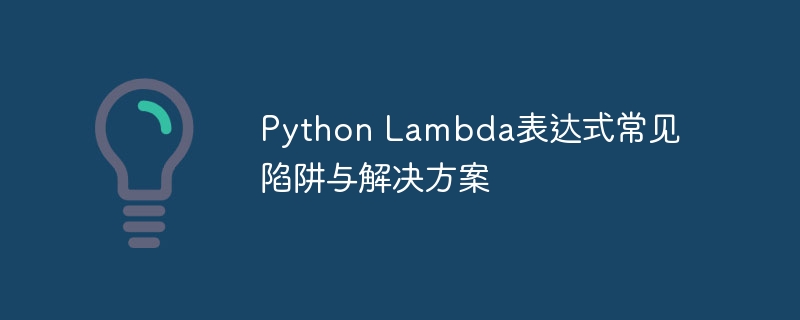

Lambda expression is an anonymous function in python. It can be used to replace traditional functions to make the code more concise. However, there are some potential pitfalls you need to be aware of when using lambda expressions, which may cause your code to behave unexpectedly.
def outer_function(): x = 10 def inner_function(): x = 15 return lambda: x return inner_function() y = outer_function() print(y())
In this code, we define a function "outer_function", and inside it defines another function "inner_function". "inner_function" returns a Lambda expression that references the variable "x". However, the variable "x" is not non-local in the lambda expression and therefore will not be accessible. To solve this problem, you need to declare the variable "x" using the "nonlocal" keyword in the Lambda expression. For example:
def outer_function(): x = 10 def inner_function(): x = 15 return lambda: nonlocal x return inner_function() y = outer_function() print(y())
Now, "x" in the Lambda expression is declared as a non-local variable, so the variable "x" in the function "inner_function" can be accessed.
def outer_function(): x = 10 def inner_function(): x = 15 return lambda: x return inner_function() y = outer_function() print(y()) print(x)
In this code, the function "outer_function" defines a variable "x" and assigns a value of 10, and the function "inner_function" defines a variable "x" and assigns a value of 15. The lambda expression returns an anonymous function that references the variable "x". When the Lambda expression is executed, it uses its own namespace, so the variable "x" has a value of 15. And the value of the variable "x" in the function "outer_function" is still 10.
def outer_function(): x = 10 def inner_function(): return lambda: x return inner_function() y = outer_function() print(y())
In this code, the function "outer_function" defines a variable "x" and assigns it a value of 10, and the function "inner_function" returns a Lambda expression that refers to the variable "x". When the Lambda expression is executed, it will use the variable "x" within its definition scope, so its output will be 10. Even though the function "outer_function" has finished executing, the variable "x" can still be accessed by the Lambda expression.
When using Lambda expressions, you need to pay special attention to these potential pitfalls and understand the principles behind them. By using Lambda expressions correctly, you can make your code more concise and efficient, but at the same time avoid the potential problems it brings.
The above is the detailed content of Common pitfalls and solutions for Python Lambda expressions. For more information, please follow other related articles on the PHP Chinese website!




